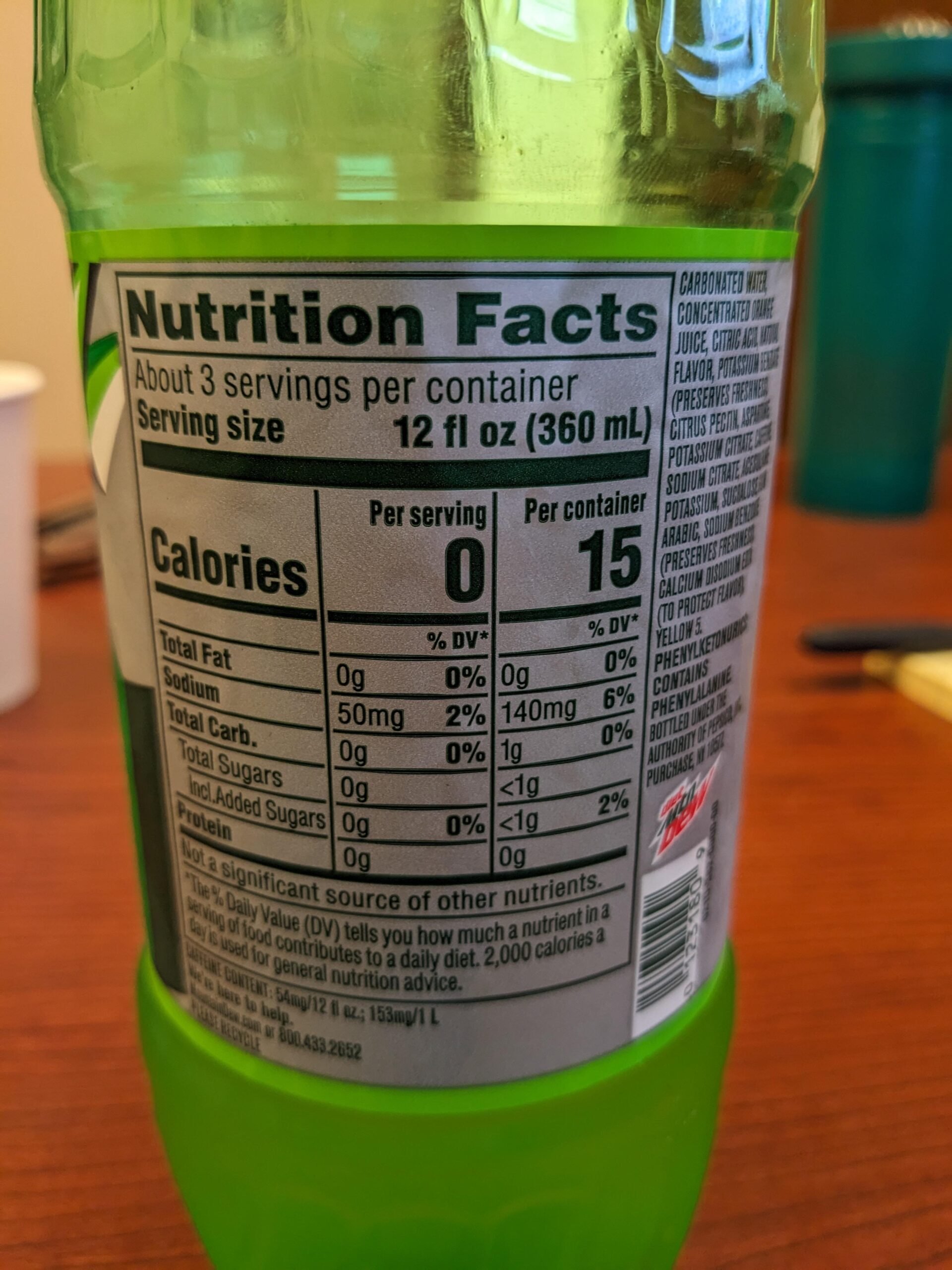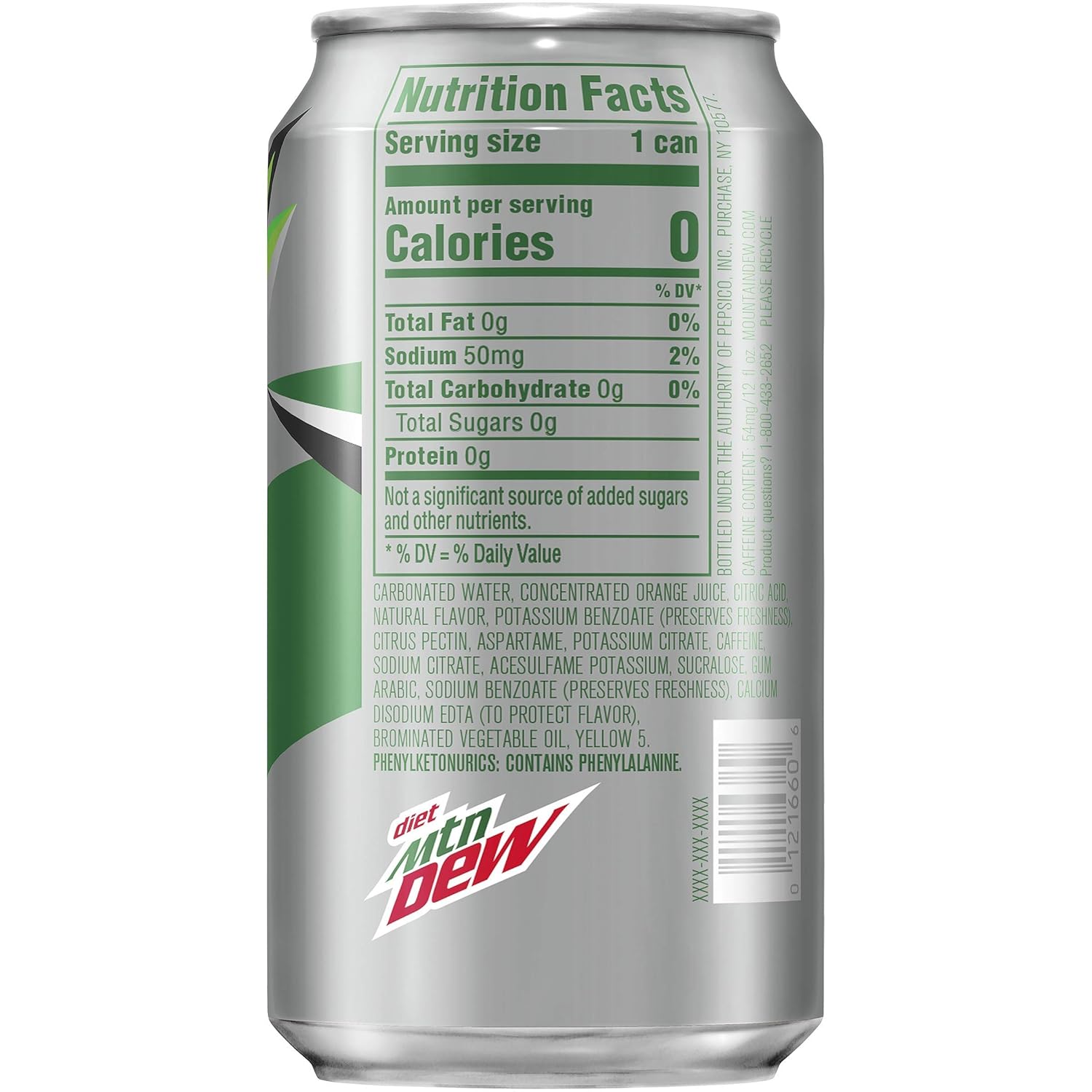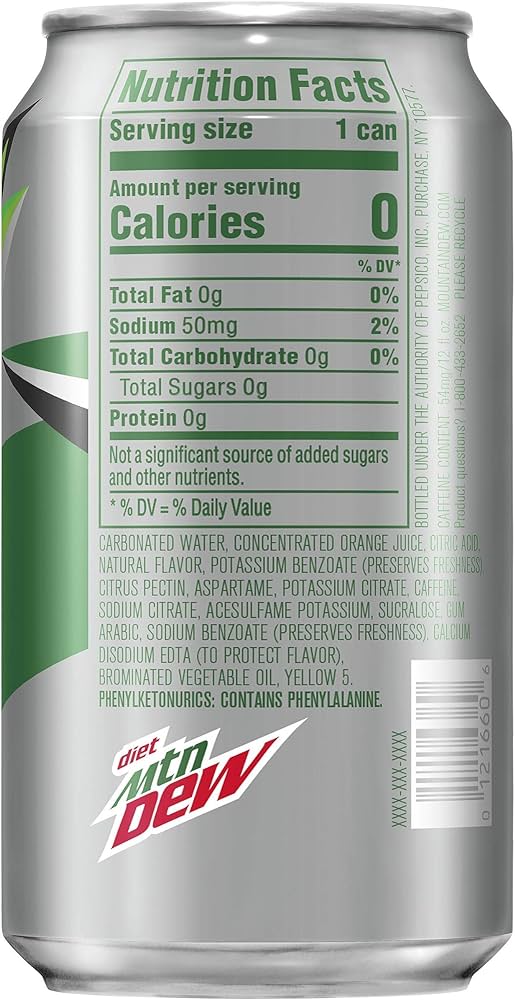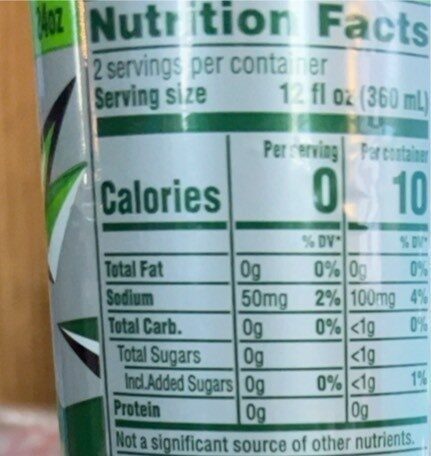Have you ever wondered what’s really in that refreshing can of Diet Mountain Dew sitting in your fridge? With so many beverage options available today, it can be challenging to sift through the hype and find trustworthy nutritional information. Let’s break it down together and get a clearer picture of what you’re sipping on.
What is Diet Mountain Dew?
Diet Mountain Dew is a sugar-free version of the original Mountain Dew, a popular citrus-flavored soft drink. Launched in 1988 as a part of the Mountain Dew lineup, it caters to those seeking a similar flavor without the added calories. This beverage is particularly popular among those who want a sweet, fizzy drink without the guilt associated with sugar.
The Flavor Profile
If you’ve had a sip of Diet Mountain Dew, you know it carries that zesty, citrusy flavor signature to the Mountain Dew family. The absence of sugar means it has a different sweetness, coming from artificial sweeteners that can stir up mixed opinions. You’ll find that some appreciate the taste while others might prefer the original’s sugar-laden recipe.
Nutritional Breakdown
Understanding the nutritional components of Diet Mountain Dew is vital when you consider it as part of your overall diet. Let’s take a closer look.
Ingredients
The primary components of Diet Mountain Dew include carbonated water, citric acid, artificial sweeteners (like aspartame and/or acesulfame potassium), caffeine, and natural flavors. Each ingredient plays a role in creating that distinct Diet Mountain Dew experience.
Common Ingredients
| Ingredient | Purpose |
|---|---|
| Carbonated Water | The base of the beverage, providing fizz |
| Citric Acid | Adds tartness and balances flavor |
| Artificial Sweeteners | Zero-calorie sweetness without sugar |
| Caffeine | Provides a mild energy boost |
| Natural Flavors | Enhances the overall taste profile |
Nutritional Information
To get a better sense of what you’re consuming, here’s the nutritional information for a 12 fl oz (355 mL) serving of Diet Mountain Dew.
| Nutritional Component | Amount per Serving |
|---|---|
| Calories | 0 |
| Total Fat | 0 g |
| Sodium | 40 mg |
| Total Carbohydrates | 0 g |
| Sugars | 0 g |
| Protein | 0 g |
| Caffeine | 54 mg |
Calorie Count
You’ll notice that Diet Mountain Dew boasts a calorie count of zero, making it an attractive option for those looking to reduce their caloric intake. However, the absence of calories doesn’t equate to a lack of ingredients or potential effects on your body.

This image is property of i.redd.it.
The Role of Artificial Sweeteners
One of the main features of Diet Mountain Dew is its use of artificial sweeteners. While they help create the sweet taste you enjoy, these additives have been subjects of debates and research for years. Let’s go into what to consider regarding these sweeteners.
Common Sweeteners Used
The primary artificial sweeteners found in Diet Mountain Dew include aspartame and acesulfame potassium. Here’s a look at them:
| Sweetener | Caloric Value | Sweetness Relative to Sugar |
|---|---|---|
| Aspartame | 4 calories/g | 200 times sweeter |
| Acesulfame Potassium | 0 calories | 200 times sweeter |
Both sweeteners are significantly sweeter than sugar, allowing for a much lower calorie count. However, their safety and effects have been frequently discussed in health circles.
Health Considerations
Research surrounding the consumption of artificial sweeteners is ongoing. Some studies suggest they can assist in weight management by replacing sugary calories, while others question their long-term effects. It may be beneficial to monitor your body’s response when consuming drinks with high levels of these sweeteners.
Caffeine Content
If you’re someone who enjoys a caffeine boost, you might be curious about the caffeine content in Diet Mountain Dew. With about 54 mg of caffeine per 12 oz serving, it offers a refreshing energy lift—a feature that often attracts soda enthusiasts.
Comparing Caffeine with Other Beverages
To better contextualize the caffeine levels, here’s how Diet Mountain Dew stacks up compared to some other popular beverages:
| Beverage | Caffeine per 12 oz |
|---|---|
| Diet Mountain Dew | 54 mg |
| Regular Mountain Dew | 54 mg |
| Cola (regular) | 34 mg |
| Coffee | 120 mg (average) |
| Green Tea | 30 mg |
While it’s not as high as a cup of coffee, it offers a moderate boost for those looking to stay awake and alert while enjoying a flavorful drink.

This image is property of Amazon.com.
The Potential Benefits
Consuming Diet Mountain Dew in moderation can offer some benefits, especially if it serves your lifestyle needs. Let’s highlight a few of them.
Weight Management
For those watching their weight, Diet Mountain Dew can be a satisfying alternative to sugary drinks, allowing for a sweet treat without the extra calories. When paired with a balanced diet, it can help maintain your caloric intake.
Enjoyment without Guilt
Sometimes, you just want something fizzy and flavorful. Diet Mountain Dew provides that enjoyment without the guilt of consuming excess sugar, making it a popular choice for many who seek alternatives to traditional sodas.
Hydration Factor
Although not a substitute for plain water, Diet Mountain Dew can contribute to your fluid intake. If you’re not particularly fond of drinking water but still want to stay hydrated, a can of Diet Mountain Dew might help meet that need.
Potential Drawbacks
While there are benefits, it’s equally important to consider potential drawbacks of enjoying Diet Mountain Dew regularly.
Taste Preferences
Not everyone is a fan of the taste of artificial sweeteners. If you find the flavor unsatisfying or too different from the original Mountain Dew, you might want to consider whether it’s worth incorporating into your diet.
Health Concerns
As with any artificially sweetened beverage, excessive consumption can lead to concerns over potential adverse effects. It’s wise to pay attention to how your body responds and to keep artificial sweeteners within recommended limits.
Caffeine Sensitivity
If you are sensitive to caffeine, the amount in Diet Mountain Dew could be an issue—especially if you enjoy it throughout the day. Monitor how much caffeine you’re consuming from all sources to maintain your comfort level.

This image is property of Amazon.com.
Mindful Drinking
If Diet Mountain Dew is part of your beverage repertoire, consider practicing mindful drinking. This concept encourages you to be aware of what you’re consuming, helping you enjoy it more while also making healthier choices overall.
Moderation is Key
As with many treats, moderation is essential. Enjoying a can here and there is perfectly fine, but regularly substituting water or other hydrating beverages with Diet Mountain Dew may not yield the best health outcomes.
Listening to Your Body
Pay attention to how you feel after consuming Diet Mountain Dew. Are you energized, or do you find yourself craving more sugar? Listening to your body’s signals can guide you toward making better choices for your health.
Alternatives to Diet Mountain Dew
If you’re contemplating your beverage choices, there are a variety of alternatives available that can satisfy your thirst and taste buds. Here are a few options worth exploring.
Sparkling Water
If you enjoy the fizz but want to avoid artificial sweeteners, sparkling water might be a beneficial alternative. Many brands offer flavored varieties that deliver refreshing tastes without added sugars or calories.
Herbal Teas
Herbal teas provide a caffeine-free option with a vast array of flavors. You can enjoy them hot or cold, as well as sweetened or unsweetened, making them versatile for your preferences.
Low-Calorie Sodas
Several brands offer low-calorie or reduced-sugar sodas that can mimic the flavor of regular sodas. Many of these options are sweetened with sugar substitutes, making them suitable for those looking to cut back on sugar intake.

This image is property of images.openfoodfacts.org.
Conclusion
In the end, whether you reach for a can of Diet Mountain Dew or choose a different beverage, what’s important is making choices that align with your health goals and taste preferences. By understanding the nutritional information and considering how it fits into your overall diet, you empower yourself to enjoy what you love in moderation.
Diet Mountain Dew may be a delightful treat now and then, but balancing it with nutritious options keeps your lifestyle healthy and rewarding. Cheers to finding the right beverages that keep you feeling your best!